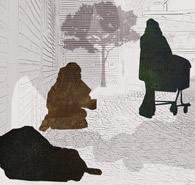The Problem of Homelessness Among Veterans
by Siegfried Othmer | February 18th, 2015by Siegfried Othmer, PhD
 Why is there a problem of homelessness among veterans? Indeed there is a shortage of affordable housing in Los Angeles, but that is not the real issue here. Rather, we are confronted with a problem of the brain. Homeless veterans are not able to sustain relationships, and eventually they find themselves out on their own. The downward slide may take years. When the Director of the Salvation Army Bell Shelter (the largest shelter for formerly homeless veterans West of the Mississippi) was asked recently about whether he was seeing a lot of veterans of the recent wars, his answer was, “not yet.” By and large, they have not yet worn out their familial and other connections. But among those still suffering from PTSD (Post-traumatic Stress Disorder) and TBI (Traumatic Brain Injury) years after return from combat, a gradual downward slide is the likely prospect.
Why is there a problem of homelessness among veterans? Indeed there is a shortage of affordable housing in Los Angeles, but that is not the real issue here. Rather, we are confronted with a problem of the brain. Homeless veterans are not able to sustain relationships, and eventually they find themselves out on their own. The downward slide may take years. When the Director of the Salvation Army Bell Shelter (the largest shelter for formerly homeless veterans West of the Mississippi) was asked recently about whether he was seeing a lot of veterans of the recent wars, his answer was, “not yet.” By and large, they have not yet worn out their familial and other connections. But among those still suffering from PTSD (Post-traumatic Stress Disorder) and TBI (Traumatic Brain Injury) years after return from combat, a gradual downward slide is the likely prospect.
The veterans themselves have absorbed the message from their military training that this is their problem to solve. And their wives and the rest of the family are on the same page with the military: Although they are prepared to help, it is ultimately their problem to solve.
We who work with brain-based dysfunctions realize just how unrealistic this is. It happens to be true that the vast majority of cases of combat-related trauma and minor TBI do resolve by themselves. Most veterans gradually recover function over time. But that is not because these veterans had more determination and willpower. Others equally well-intentioned and engaged on the matter do not recover on their own.
When the trajectory is not upward toward recovery, then it is likely to be downward toward progressive dysfunction. Unfortunately the Department of Veterans Affairs is not much help in those cases. Veterans are typically offered medications that are little more than a patch on the problem, and eventually veterans stop seeking help from that quarter.
All the while a simple remedy for both PTSD and TBI exists in neurofeedback. Through neurofeedback we show the brain its own activity, and the brain uses that information to find its way back to good function. This works marvelously and it works relatively quickly. And we have the recorded experience of hundreds of veterans of all ages and backgrounds to back this up, not to mention cases from the population at large that go back decades for TBI and up to seven years for PTSD (using our new approach).
We have worked successfully with the veterans of wars going all the way back to World War II. Age is not much of a factor in recovery capability. The living brain is always capable of learning. Much of our work has been done with Vietnam era veterans, which shows that even after forty years good brain function is still attainable. But there is value in starting as early as one can to put the brain on a better track. Our work with veterans of our recent wars shows that they recover more quickly, by and large, indicating that the dysfunction is not as thoroughly consolidated.
Finally, when the training is done with service members still on active duty, they are typically capable of recovering fully and assuming their prior responsibilities. When the training was done with active duty in Afghanistan and Iraq, it was very helpful in restoring good sleep, in stress reduction, and in recovery from minor head trauma.
Successful neurofeedback training means that veterans are able to shed any dependence on drugs and alcohol, reconnect with family, re-establish lasting and rewarding personal relationships, and find their way back into working lives. For veterans troubled by PTSD and TBI, neurofeedback can be a path back to wellbeing, not just a way to reduce or eliminate symptoms.
Related Resources
For another look at neurofeedback for addiction to heroin and cocaine, read my article A Case of Addiction to Heroin and Cocaine
Homecoming for Veterans – hc4v.org
Homecoming for Veterans offers neurofeedback, at no cost, for suffering from Post-Traumatic Stress Disorder (PTSD) through a network of clinicians across the country.





